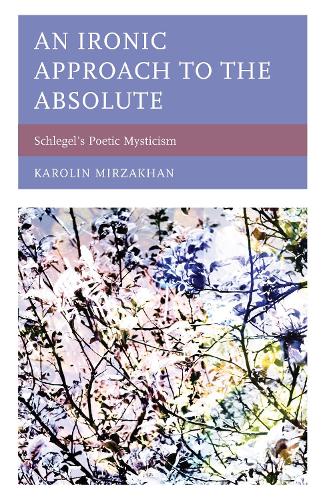
An Ironic Approach to the Absolute: Schlegels Poetic Mysticism
(Hardback)
Available Formats
Publishing Details
An Ironic Approach to the Absolute: Schlegels Poetic Mysticism
By (Author) Karolin Mirzakhan
Bloomsbury Publishing PLC
Lexington Books
6th March 2020
United States
Classifications
Professional and Scholarly
Non Fiction
Mysticism
Comparative literature
809.19384
Physical Properties
Hardback
140
Width 160mm, Height 229mm, Spine 16mm
381g
Description
An Ironic Approach to the Absolute: Schlegels Poetic Mysticism brings Friedrich Schlegels ironic fragments in dialogue with the Dao De Jing and John Ashberys Flow Chart to argue that poetic texts offer an intuition of the whole because they resist the readers desire to comprehend them fully. Karolin Mirzakhan argues that although Schlegels ironic fragments proclaim their incompleteness in both their form and their content, they are the primary means for facilitating an intuition of the Absolute. Focusing on the techniques by which texts remain open, empty, or ungraspable, Mirzakhans analysis uncovers the methods that authors use to cultivate the agility of mind necessary for their readers to intuit the Absolute. Mirzakhan develops the term poetic mysticism to describe the experience of the Absolute made possible by particular textual moments,examining the Dao De Jing and Flow Chart to provide an original account of the striving to know the Absolute that is non-linear, non-totalizing, and attuned to non-presence. This conversation with ancient and contemporary poetic texts enacts the romantic imperative to join philosophy with poetry and advances a clearer communication of the notion of the Absolute that emerges from Schlegels romantic philosophy.
Reviews
"Mirzakhan states that her purpose in writing is pedagogical, and her attention to her readers and skill as a communicator are evident throughout this sensitive text. As Mirzakhan claims, Schlegels writings on irony and the Dao De Jing are mutually illuminating, especially as deployed by Mirzakhan. Mirzakahns patient, insightful unpicking of Schlegelian irony and its resistance to Hegels criticism in the early chapters provides an access point to some of the most apparently counter-intuitive claims of this ancient text. Mirzakhans careful exposition of the use of metaphor, performance and other indirect forms of communication in the Dao De Jing guide the reader towards what is unspoken, unilluminated that which exceeds language and thought at the heart of Schlegels philosophy. Mirzakhan concludes with a lucid account of John Ashberys poem Flow Chart that brings the encounter with the Absolute into the 20th century."--Anna Ezekiel, University of York -- Anna Ezekiel, University of York
"The philosophical significance of Early German Romanticism has regained considerable recognition and, within this movement, Friedrich Schlegel deserves special attention. Karolin Mazakhan's well-written study succeeds in illuminating the complex ironic features of Schlegel's work by comparing it in an original way with that of other writers, ancient (Laozi) and contemporary (Ashbery)."--Karl Ameriks, University of Notre Dame -- Karl Ameriks, University of Notre Dame
Author Bio
Karolin Mirzakhan is a lecturer of philosophy at Kennesaw State University.
